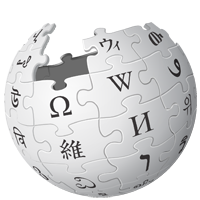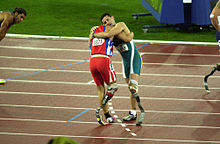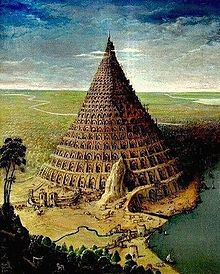Wikipedia:Wikipedia is a work in progress
This is an essay. It contains the advice or opinions of one or more Wikipedia contributors. This page is not an encyclopedia article, nor is it one of Wikipedia's policies or guidelines, as it has not been thoroughly vetted by the community. Some essays represent widespread norms; others only represent minority viewpoints. |
| This page in a nutshell: Wikipedia is a living document, constantly improving and expanding. It will never be a finished work. |

Wikipedia is, by number of articles, the largest encyclopedia ever to have existed. It contains a lot of information, and has been edited and viewed by millions of people, many of whom have found it useful. Unfortunately, much of it could be a lot better. Many people have eagerly pointed this out—often failing to give weight to the notion that it has been created entirely by volunteers, from nothing, in just two decades—and some have even suggested that the Web would be better off without it. However, in airing their complaints, they frequently miss out one crucial detail: Wikipedia is not and will never be finished. Not even close. In fact, we're just getting started.
In its very early days, Wikipedia went through several major software changes. Existing wiki software was not designed for writing encyclopedias, and developing the first version of MediaWiki took time. As a result, much of the earliest page histories have been lost, and while the history of some pages is preserved right back to January 2001, other pages which are equally old have no information from before 2002. It is possible to see Wikipedia as it looked in its entirety in December 2001, as a read-only copy of the pages at that time is hosted at nostalgia.wiki.x.io. To really demonstrate the point, though, it is necessary to go back even further.
Imagine you're Nupedia contributor RoseParks. It's mid-afternoon on Tuesday, 30 January 2001. You heard about Wikipedia being set up through your work on Nupedia, and you've created a couple of pages over the past week or so. The project seems to be going pretty well; there are nearly six hundred articles—more than Nupedia has—although they are all rather short and most lack information in important areas. You notice that one thing Wikipedia doesn't have an article about is the mathematical concept of sets. So you create a page, titled "SeT" (as the rather elementary wiki software forces you to use CamelCase titles), and write the following:
A SeT is a collection of objects. For example, one can define the set S = {Sn: Sn is a sibling of the Larry M. Sanger, who is the Editor-in-Chief of Nupedia}.
We require that sets be well-defined. Given an object Sn, we must be able to determine if
Sn belongs to S.----
What, there are no recursively enumerable sets?
It's not Shakespeare. Nor is it a particularly good article, even by January 2001 standards. Someone wishing to learn about sets would be foolish to use this as their only source of information. But it's a start. It's better than nothing.
You wonder what kind of future Wikipedia has. Six hundred pages are all very well, but proceeding at the current rate it will be decades before the encyclopedia is big enough to be useful. Will it become popular some day, or join the long line of ideas that didn't quite make it (a line recently joined by many commercial Web start-ups)?
Fast-forward twenty-two years and the answer to this question is obvious. Wikipedia is one of the most visited websites on the Internet, it has grown to more than 6.9 million articles in English alone, and versions are being written in over two hundred languages. Something else has changed too, though. People have started using Wikipedia as a source of information. There's nothing wrong with that—after all, it would be ridiculous not to make use of such a resource, for all its defects. Furthermore, though, people have started to rely on it as a source of information, often as their only source of information about a particular topic. This issue predates Wikipedia, of course—citation of encyclopedias in academia having long been discouraged—but Wikipedia has brought with it both problems and benefits beyond those of traditional encyclopedias, one of which is its permanent status as a work in progress. Pinning down the time at which this really began to happen would be difficult (probably impossible), but is likely sooner rather than later; 2002 at the latest.
But wait... nobody said Wikipedia was ready to be used! In the early days, it was clear at a glance that Wikipedia was not an authoritative work—a small number of pages, relative to the average encyclopedia, short articles, filled with to-do notes and empty sections, and an abundance of what we now call "red links" (which in the early days appeared as small question marks; this is still available as an option in user preferences). Since then the project has recognized that it has an audience, and tried to make itself more presentable, which is admirable. It has also been forced to take measures to prevent abuse of the wiki system by users uninterested in improving the project, which is unfortunate but inevitable. However, it has also begun to treat itself as a work approaching completion. What? No one ever said that Wikipedia was even good, let alone ready to be finished! Many have suggested that with more than two million articles written, there can't be that many more to write, and have—partly in response to external pressure—turned their attention to the quality of the articles. A shift in focus from quantity to quality has taken place—in itself a good thing, but it has brought problems. The project has stopped looking forward ("Wow, we have a million articles!")—and started looking back ("Oh no, most of our articles are rubbish!").
| Graphs are unavailable due to technical issues. Updates on reimplementing the Graph extension, which will be known as the Chart extension, can be found on Phabricator and on MediaWiki.org. |
Somehow, we have taken what was originally blatant, and always a given—that the encyclopedia is incomplete and lacks consistent quality—and turned it into a problem. Like the inherent drawbacks of the wiki system, this problem cannot be solved without fundamentally altering the nature of the project. If we focus too strongly on how good the existing encyclopedia is, rather than on improving it, the project will become bogged down and the overall rate of improvement will slow. This has already happened to some extent. The solution is to return to the strategy that brought Wikipedia to where it is today. In short, it doesn't matter how terrible and unreliable and inconsistent and trashy Wikipedia is, because we can always make it better. Remember that Wikipedia is a work in progress. Don't waste time measuring that progress, make the progress happen.
Rather than taking weeks and expending heaps of effort bringing one article that's merely "very good" up to "featured status", turn a hundred bad articles into good ones. (This is not a reference to "good" as in "Good Article" status. Thousands of perfectly acceptable articles lack this.) Rather than spending weeks ploughing through article assessment backlogs—which is all some WikiProjects seem to do now—forget about assessment classes and tagging, and actually improve the articles which you're "assessing". The same goes for cleanup and maintenance tags. And most importantly, write the encyclopedia. Don't let the impressive article count figure fool you; there are thousands of article requests sitting unanswered, and thousands more important, encyclopedic topics that nobody has thought to request. There are also many more thousands of one- or two-sentence stubs; adding a few more sentences to one won't make it a featured article, or change its "assessment class", but it will vastly improve that article. The project will benefit, in the end, if its original spirit is maintained.
Recently, people have been getting themselves in a panic because the quality of Wikipedia is not as high as they'd like it to be. Now this is a problem, certainly, for anyone who wishes to depend upon Wikipedia as a high-quality, reliable source of information. But to someone who wishes to write a free encyclopedia, it's not a problem. It's an opportunity, and that's what we're here for. Remember, there is no due-date.
So, if you rely on Wikipedia so much in its current state, that's your problem. We're not done with it, and we never said it would be any good—we only said it would be free (Wikipedia • The Free Encyclopedia). If you aren't satisfied with it now, help improve it, or come back in another six or seven years and take a look then. It'll be better. We promise.
Will it ever be done?
[edit]

Nope. Not in the Sun's lifetime at least.
Imagine that a featured article (FA) represents a finished article, one that does not need any further editing (this, of course, is not true, but a featured article is the closest thing Wikipedia has to a "finished" article). Now imagine that all of Wikipedia's editors take all of the world's academic resources, lock themselves in a room that is impenetrable by light, sound, and even Captain Falcon, and set about bringing all of Wikipedia's existing articles to FA status. As of 2021[update], we are churning out FAs at a net rate of 147 per year,[2] but we'll assume that the editors are slightly more productive when locked in the editorium and round it up to 200 FAs per year. Currently, there are 6,941,133 articles in the English Wikipedia and 6665 FAs. This gives us a total of 6,934,468 non-FAs. Let's assume that the editors also quickly jotted down a list of 47 missing articles on a post-it note. This gives us the convenient numbers of 6,934,515 articles to bring to FA status at a rate of 200 per year. This would take approximately 34,673 years. Jeepers!
In that time, many things will have happened:
- Lots of stuff will have happened, some of which will need to be documented on Wikipedia. Take a look at Category:1990s. That category has 729 subcategories. Even if each subcategory has but a single article in it (a fairly conservative estimate, to say the least), that's a lot of articles. At the rate of 729 new things per decade, by the end of the 34,673-year editing period, 2,527,662 new things will have happened! And don't forget that many man-made features would have disappeared and have been replaced by new ones.
- The English language will have completely changed, and all of the articles would have to be rewritten to conform to the new standards. Take a look at Phineas Gage, which includes quotes from the mid-1800s. See how odd the writing seems when compared with the rest of the article? And that was from less than 200 years ago. Now multiply that language flux by 173 to get the total language flux that would occur in 34,700 years. Yipes.
Or maybe it will get almost done:
As of December 2007, 7 World Trade Center has 2553 revisions. Blindly assuming that edits are roughly homogeneous, WP therefore has between 100,000 and 200,000 edits per day. This equates to adding between 40 and 80 featurons (a unit of article quality) per day. Since we are getting better at this, and reducing vandalism / fixing with edit filters etc., let's take the higher number (and we could probably improve massively on that) and 4 million articles, each needing a total of 1 featuron total effort. There have been approximately 350 million edits, assume 250 million are to articles, that corresponds to 10,000 featurons of the required 4 million. At that rate we are looking at a mere century. Alternatively suppose every student at Indiana University was required to bring one article to featured status every year as part of their degree course, then it would only take 30 years. And that is one university, in one country. So yes, those missing puzzle pieces, we'll always need more people to help fill them in. Always. And yes, we are 99% done and we're going to stay that way. Forever.
Other major reference works take time too:
- Polish Biographical Dictionary—started 1935, estimated completion 2030
- Oxford English Dictionary—first edition 1857–1928, third edition est. 1993–2037
Useful templates
[edit]Using the {{expand section}} template yields this result:
This section needs expansion. You can help by adding to it. |
Which may be a good way of letting other readers and editors know what, where, and how to contribute.
See what we're still missing!
[edit]- Wikipedia:WikiProject Missing encyclopedic articles
- Category:Wikipedia missing topics
- Category:Wikipedia requested articles
- Wikipedia:Maintenance
- Category:Wikipedia red link lists
- User:Piotrus/Wikipedia interwiki and specialized knowledge test — How many articles are left?
- d:User:Emijrp/All Human Knowledge
- Bored? Policy-weary? Write something (Blog post)
See also
[edit]References
[edit]- ^ "Wikistats - Statistics For Wikimedia Projects". stats.wikimedia.org. Wikimedia Foundation. Retrieved 11 February 2022.
- ^ Wikipedia:Featured article statistics
